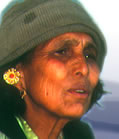THEMES IN THIS
TESTIMONY
Agriculture

Communications

Community Activities

Development

Identity

Justice and crime

Social Relationships

Water

Click on arrows
to find more
testimonies
featuring
these themes
|
|
Sex
|
male
|
|
|
Age
|
56
|
|
|
Identity
|
Hindu, Brahmin caste
|
|
|
Occupation
|
farmer
|
|
|
Location
|
Bhadrakali VDC, Sindhuli
|
|
|
Date
|
January 1994
|
|
summary
The interview covers a number of topics and contains some interesting details on education, land reform, natural disasters, forestry and village development. The narrator believes there is much more equality now, whereas “in the olden days, the big and strong or the clever ones dominated the weak and meek ones. But now with the democracy, we all have the right to defend ourselves, we can take for ourselves, so I think it is getting better”. Inter-caste relations have also improved and people now respect the customs of other castes. In the past, “people were not so friendly with each other, they didn’t trust each other”. These days, “people have realised that we all should live in peace and harmony … now they respect each other”.
However, democracy is not always wholly beneficial – he notes how some people use it to justify their increased consumption of trees. For example, while some villagers are planting new trees, others are cutting down “the trees planted along the roadside, they have become a menace. They think that in a democracy people can do anything”. He also bemoans the fact that participation has given way to passivity. He says people now depend on the government to do things for them, such as provide roads and bring drinking water, with the result that things are done badly or not at all.
Towards the end of the interview he his asked about his own and his children’s future: “as long as I live I want to be good and do good and teach others to do the same, I hope I'll be happy then... I have spent all my life farming and now I'm getting old, so I wish my children to have good jobs, lead a good life and do good to everybody throughout their lives.”
detailed breakdown
|
You will need a password from Panos to view the full
transcript of the interview. To apply for a password, click here.
Once you have a password, click here to go to the beginning
of the transcript. You can also click on any section of the
breakdown of content below and go straight to the
corresponding part of the transcript.
|
| Section 1-3 |
Family background.
Relates settlement history of village, back to cave-dwelling jungle people. “Now the forest has thinned down, the bamboo are scarce, it is not like the olden days.” Grasses and grazing land also less good.
|
| Section 3-5 |
Recalls earthquakes and floods that led to landslides, washed forest away, and caused half the population to move away.
Recalls drought in BS 2011: “In this area about 13/14 people died due to starvation”. 25-30 children died in measles epidemic a few years later. Some wildlife rare now because of deforestation, which has also led to soil erosion and landslides. However, some poor people still collect medicinal plants from the forest and sell them.
|
| Section 6-8 |
“Before we had a saying that 'son is wealth' but nowadays people have started family planning.”
Describes land reform process: “They distributed the land like presents, people got whatever they asked for, they even built small huts for people to live in and live freely.” People had to cut down trees in the area in order to settle.
Changes in agricultural practices.
Animal husbandry “is not so popular because of the disease, before there were no diseases in animals.” He attributes this increase in disease to the fact that, “now people travel more, they take and bring things from one place to another” thereby spreading disease.
|
| Section 8-9 |
Primary and high schools have been built, and are run with some difficulty using funds raised within village. He describes the apathy from the government and the villagers: “We don't have enough teachers and the District office has not given any quota for the high school in this area. Maybe that is why the people haven't shown any interest. I'm sure it will improve but the villagers also have to take interest in it.”
Some people are “still in the dark; they are still not educated” but he feels attitudes towards female education have improved.
|
| Section 9-11 |
“I think it rains more now, maybe that is why there are more floods and landslides.”
He believes people have advanced in the village, but although he is optimistic about the afforestation programme in the village, he states that “Only perhaps half of the villagers agree to it and the other half still does not understand the importance of forest.”
Describes traditional form of community organisation and collective work when canals etc had to be dug. A similar system still exists, “but now people think that it's government work to make the roads so they do not work, and they are also waiting for the government to bring them drinking water.” He blames the current poor water supply, lack of roads, etc, on this over-reliance of villagers on outside help.
|
| Section 12-13 |
Says inter-caste relations have improved: “now they respect each other and respect the customs of other castes.”
His hopes for the future: “as long as I live I want to be good and do good and teach others to do the same, I hope I'll be happy then...”
His mother died when he was five and since then he has faced many problems.
|
|


